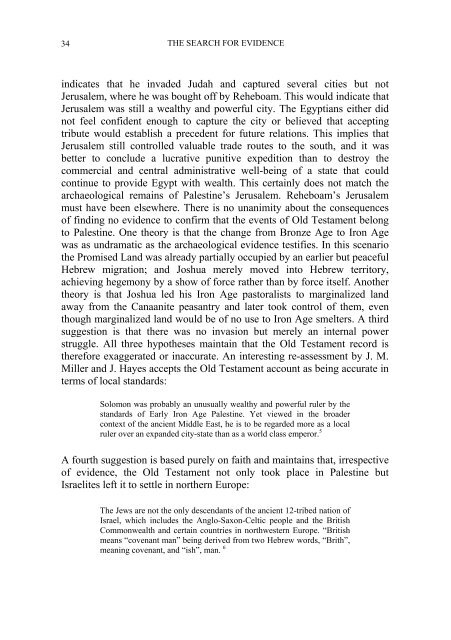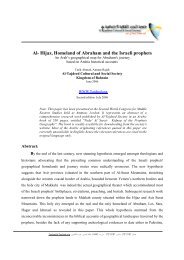Sheba
Sheba
Sheba
Create successful ePaper yourself
Turn your PDF publications into a flip-book with our unique Google optimized e-Paper software.
34<br />
THE SEARCH FOR EVIDENCE<br />
indicates that he invaded Judah and captured several cities but not<br />
Jerusalem, where he was bought off by Reheboam. This would indicate that<br />
Jerusalem was still a wealthy and powerful city. The Egyptians either did<br />
not feel confident enough to capture the city or believed that accepting<br />
tribute would establish a precedent for future relations. This implies that<br />
Jerusalem still controlled valuable trade routes to the south, and it was<br />
better to conclude a lucrative punitive expedition than to destroy the<br />
commercial and central administrative well-being of a state that could<br />
continue to provide Egypt with wealth. This certainly does not match the<br />
archaeological remains of Palestine’s Jerusalem. Reheboam’s Jerusalem<br />
must have been elsewhere. There is no unanimity about the consequences<br />
of finding no evidence to confirm that the events of Old Testament belong<br />
to Palestine. One theory is that the change from Bronze Age to Iron Age<br />
was as undramatic as the archaeological evidence testifies. In this scenario<br />
the Promised Land was already partially occupied by an earlier but peaceful<br />
Hebrew migration; and Joshua merely moved into Hebrew territory,<br />
achieving hegemony by a show of force rather than by force itself. Another<br />
theory is that Joshua led his Iron Age pastoralists to marginalized land<br />
away from the Canaanite peasantry and later took control of them, even<br />
though marginalized land would be of no use to Iron Age smelters. A third<br />
suggestion is that there was no invasion but merely an internal power<br />
struggle. All three hypotheses maintain that the Old Testament record is<br />
therefore exaggerated or inaccurate. An interesting re-assessment by J. M.<br />
Miller and J. Hayes accepts the Old Testament account as being accurate in<br />
terms of local standards:<br />
Solomon was probably an unusually wealthy and powerful ruler by the<br />
standards of Early Iron Age Palestine. Yet viewed in the broader<br />
context of the ancient Middle East, he is to be regarded more as a local<br />
ruler over an expanded city-state than as a world class emperor. 5<br />
A fourth suggestion is based purely on faith and maintains that, irrespective<br />
of evidence, the Old Testament not only took place in Palestine but<br />
Israelites left it to settle in northern Europe:<br />
The Jews are not the only descendants of the ancient 12-tribed nation of<br />
Israel, which includes the Anglo-Saxon-Celtic people and the British<br />
Commonwealth and certain countries in northwestern Europe. “British<br />
means “covenant man” being derived from two Hebrew words, “Brith”,<br />
meaning covenant, and “ish”, man. 6




